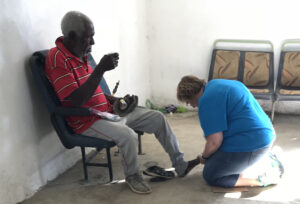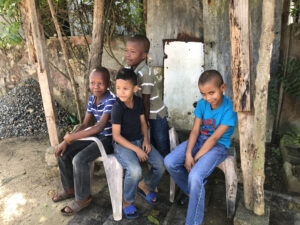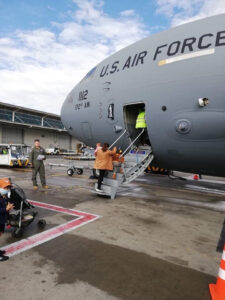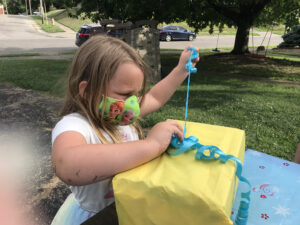After serving full time in the West Indies for 13 years, it has been my privilege to work with missionaries through counseling for the last 9 years. Covid 19 has certainly been a unique challenge for everyone but how does that look for missionaries? How can the local church help missionaries whether they have chosen to return to their passport country, chose to remain in their country of service or are “stuck” there due to borders and airports closing.
It is often normal for missionaries to be frontline responders of natural disasters, severe poverty, widespread diseases and personal emergencies. Eventho these experiences may be part of their everyday service fueled by their compassion, it doesn’t always happen without residual effects, “Collateral Damage.” Somewhere along their service they may develop Post Traumatic Stress Disorder (PTSD) when they run out of urgent medical supplies to sustain life or their own families suffer lack of food or water. PTSD can cause flashbacks when triggered by news reports of inadequate medical supplies or grocery shelves being empty or people kicked into survivor mode. Other issues, may be fear over loved ones being exposed to Covid or anxiety over a sudden rush to find housing for their University MK (Missionary Kid) when all dorms were abruptly closed in the midst of their own evacuation.
Under normal conditions, Missionaries are often very resilient and can control anxiety, fear, depression, etc. Yet, when going through sudden, unexpected changes they may experience insecurity, loneliness, loss of identity, estrangement, being financially unprepared, face interrupted expectations, depression and/or fearing the unknown. “Jesus replied, “You don’t understand now what I am doing, but someday you will.” John 13:7 So how does the church come along side Missionaries to face these challenges and trust in God’s plan?
Pray: Of course, one of the greatest ways everyone can help is through prayer. “Hold up” the missionaries in support while they are in the midst of change, decisions, self-care, and trusting. They need prayer and encouragement as Aaron and Hur did for Moses (Ex 17) when he was faced with a battle. The missionary needs to know they are not alone in this process. Pray with them to help remove layers of stress, losses and numerous changes. Pray for each family member specifically and regularly as well as the work temporarily left behind.
Be sensitive to their needs: They will need to find their place of belonging, safety, comfort and privacy. To support the children, find a way to assist the family in providing attention, listening, being a friend, adjusting to culture changes, not everyone handles change well. Give the parents a break by caring for the children in their comfort zone (they’ve already been through many changes) while parents get to recoup. Help them find resources for their needs.
Don’t judge their decisions. Remember their stresses, pressures and factors with which you aren’t aware. They know the personalities and emotional health of their family members and mission obligations.
Listen to them: Provide a safe environment for them to share their stories, fears and needs. Please hold their confidences for them to share in their own timing.
Recommit to your financial support through this experience. Often missionaries must continue covering foreign expenses while visiting their passport country. If anything must change be open, honest and considerate. Consider a Gift Card Shower for groceries, gas, pharmacy, department store or entertainment. Surprise them with a delivered meal.
Make expectations clear: Include expectations of the family, the church, the staff, etc. If the family is expected to pay or not pay for expenses: lay out the details to prevent stressful, surprise financial issues. If the church expects the missionary to fulfill any staff obligations, make that clear. Places of the unknown are places where fear and anxiety can attack.
Help the family reconnect and feel a belonging. Have a SS teacher or Children’s Leader introduce themselves and help children feel included yet not singled out. Help teens who are already dealing with their identity, adjust to cultural norms of slang, trends, etc. Parents also need included and specifically invited to Small Group Bible Studies, MOPS, Men/Women’s Zoom groups.
Give them a Purpose: When ready, welcome the missionary to prepare a Bible study or assist in an activity. Many missionaries are very active normally and sitting around can really defeat them or bring on depression. Provide temporary office space or use of office equipment for their ongoing work and communications.
Personal Encouragement: Make regular phone calls to check in on the family, ask for any needs, display genuine interest in what they hear from their field of service. Pray together with them for those they left behind. Help them be reassured of their identity as a missionary to maintain/increase their confidence, value in ministry and purpose. Give them grace and the freedom to be emotional without fear of judgement.
Distanced Care: If the mission family can’t come home, there are ways to help them though distanced. Some missionaries have elderly or ill parents that need medical care, prescription refills, or a ride to church. If the local church can take on this ministry, the missionary family might be able to remain on the field longer (or return sooner if delaying return to the field). Send personal encouragement cards or letters. Include a written prayer that can be an ongoing source of encouragement. Do a weekly WhatsApp visit. Let them talk and share what’s on their heart. Listen! Share what you did to remember and support them since the last contact. Conclude with prayer to press on.
Thank you for your compassion for those who serve the Lord around the world. Being open-minded, creative and empathic will help develop ways to express your desire to “hold up” your missionaries.
Kathy Girton – Missionary/Counselor with WICM-West Indies Christian Mission and Wellness in Christian Ministries
















